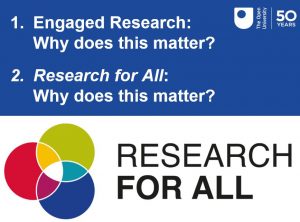
Professor Richard Holliman, The Open University.
Under the leadership of Sandy Oliver, Sophie Duncan and Pat Gordon-Smith, UCL Institute of Education, NCCPE and UCL IOE Press are running an all-day seminar on 7 May 2019.
We will be discussing progress to date, and the possible futures for Research for All, an open-access peer-reviewed international journal that launched in 2017.
As a member of the External Advisory Board (and co-author of a paper; Holliman and Warren, 2017) for the journal, I was delighted to be invited to open the day.
I’ll be offering answers to two questions:
- Engaged Research: Why does this matter?
- Research for All: Why does this matter?

Engaged Research: Why does this matter?
The first question, of why engaged research matters, is something that has been considered in some detail (e.g. Duncan and Oliver, 2017).
What can I add? My plan is to introduce a philosophical lens in answering this question, by applying Miranda Fricker’s (2007) concept of epistemic injustice to engaged research.
In addressing the second question, of why the journal Research for All matters, my plan is to explore a couple of key changes in the relationship between academia and wider society. One focuses on communication (how we share knowledge; e.g. Holliman et al. 2009), the other engagement (who has a voice in research and how those voices are enabled to be heard, e.g. Holliman, 2017).
In essence, I will argue that these issues matter because the public sphere is not a level playing field.
Some actors have greater access to knowledge and engagement than others. I will argue that engaged research should have a moral imperative, to reduce forms of epistemic injustice and promote fairness in knowing (Medvecky, 2018; Holliman, 2019).
To promote fairness in knowing we need to address questions both of who has a voice in research, therefore who is excluded, as well as how those voices are enabled to meaningfully engage. It is essential that researchers plan upstream with relevant stakeholders, to ensure that meaningful engagement can ensue (Holliman et al. 2018).
Research for All is an increasingly important channel for representing the different contributions to engaged research once it is completed. Long may it thrive!
References
Duncan, S. and Oliver, S. (2017). Motivations for engagement. Research for All: Advancing Public Engagement with Research, 1(2), 229-233, https://doi.org/10.18546/RFA.01.2.01.
Fricker, M. (2007). Epistemic injustice: Power and the ethics of knowing. Oxford: Oxford University Press.
Holliman, R. (2019). ‘Fairness in knowing: How should we engage with the sciences?’ Inaugural Lecture, Berrill Lecture Theatre, Milton Keynes, The Open University, 12 March.
Holliman, R. (2017). Supporting excellence in engaged research. JCOM 16(5), C04, pp. 1-10, http://oro.open.ac.uk/52439.
Holliman, R., Hollingworth, N., McCombie, J., Leach, K., Townsley, R., Fuller, I. and Gillespie, D. (2018). Pathways to Excellence in Public Engagement. Science and Technology Facilities Council (STFC), Swindon, http://oro.open.ac.uk/57601.
Holliman, R. and Warren, C.J. (2017). Supporting future scholars of engaged research. Research for All: Advancing Public Engagement with Research, 1(1), 168-184, http://oro.open.ac.uk/48223.
Holliman, R., Whitelegg, E., Scanlon, E., Smidt, S. and Thomas, J. (eds.) (2009). Investigating science communication in the information age: Implications for public engagement and popular media. Oxford, UK: Oxford University Press, http://oro.open.ac.uk/13050.
Medvecky, F. (2018). Fairness in knowing: Science communication and epistemic justice. Science and Engineering Ethics, 24(5), 1393–1408, https://doi.org/10.1007/s11948-017-9977-0.
